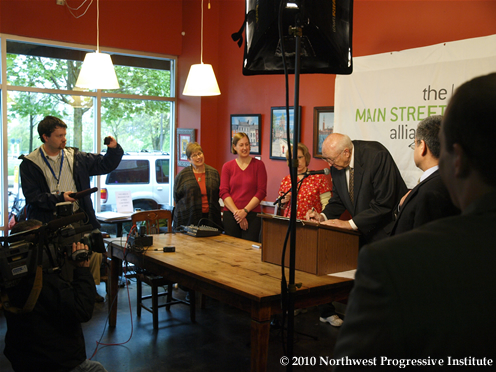Meet the Hypocrites: Steve Jobs
Jobs doesn't waste time trying to refute Adobe's contention that Apple is locking Flash out of the iPhone and iPad to protect its own self-interest. Early on his column, he argued that "technology issues" are behind Apple's position (which Adobe's CEO later dismissed as "a smokescreen".)
That led to the following paragraph:
Adobe’s Flash products are 100% proprietary. They are only available from Adobe, and Adobe has sole authority as to their future enhancement, pricing, etc. While Adobe’s Flash products are widely available, this does not mean they are open, since they are controlled entirely by Adobe and available only from Adobe. By almost any definition, Flash is a closed system.Notice anything curious about that paragraph? It's a perfect description of Apple's own business practices! Just replace "Adobe" and "Flash" with "Apple" and "iPhone", "iPad", "iPod/iTunes", or "Mac" and you get a nicely worded four sentence critique of Jobs' own company. Seriously... How can Jobs talk about openness when his notoriously secretive company is not only hypocritically on the warpath against Adobe, but recently goaded police into initiating a criminal investigation over the disappearance of Apple's fourth generation iPhone prototype, which was lost by one of Jobs' own employees!?
Jobs goes on to admit that his own company's products are proprietary, but quickly moves into self-congratulatory mode, extolling the greatness of WebKit:
Apple even creates open standards for the web. For example, Apple began with a small open source project and created WebKit, a complete open-source HTML5 rendering engine that is the heart of the Safari web browser used in all our products. WebKit has been widely adopted. Google uses it for Android’s browser, Palm uses it, Nokia uses it, and RIM (Blackberry) has announced they will use it too. Almost every smartphone web browser other than Microsoft’s uses WebKit. By making its WebKit technology open, Apple has set the standard for mobile web browsers.A reader perusing this paragraph might get the impression that the "small open source project" Jobs refers to was something brewed up in Apple's labs, which Apple turned into a major success story.
Actually, that "small open source project" was a component of a much larger free software project called the K Desktop Environment, better known as KDE. KDE is developed by a community of free software enthusiasts; it is one of the most popular desktop interface choices for GNU/Linux distributions.
Here's the backstory Jobs doesn't bother to provide in his column.
Back at the beginning of this decade, Apple took the code from two KDE projects (KHTML and KJS) and quietly modified it to suit their own purposes. The overall results became WebKit. Although the source code for Apple's modified versions of KHTML (WebCore) and KJS (JavaScriptCore) were made available at the time Apple released Safari, Apple did not open source WebKit as a whole for three long years.
Moreover, Apple failed to work constructively and openly with KDE's developers to further develop the code they had ported. Five years ago to the day tomorrow, one of KDE's developers commented on Apple's relationship with KDE at the time, reflecting in a message to Apple's Dave Hyatt:
At some point the Open Source ideals which we apply to KHTML and commercial setup in which you emerge yourself went in two different directions. At this point we have two completely separate groups developing two different versions of KHTML. We have absolutely no saying in the way you develop your version of KHTML and you don't participate at all in the way we develop KHTML.Eventually, Apple's modified version of KTHML did become the new KHTML, and it is now used as the engine for KDE's Konqueror and even GNOME's Epiphany, both browsers native to GNU/Linux. But that only happened after KDE developers had bitterly protested the way they were being treated by the Cupertino software giant.
Since WebKit's major components come from KDE, and Apple did not create KDE, it's misleading for Jobs to claim that "Apple... creates open standards for the web." Imagine if Microsoft tried to claim it "creates open standards" because it had released some code under the GNU GPL. They'd be laughed at. But that's what Steve Jobs is deceptively doing here.
Apple's contributions to the free software community have, to date, been nothing more than token offerings compared to companies like IBM, Red Hat, Canonical, or Novell. When Apple releases its Mac OS X operating system, iLife productivity suite, or Final Cut Pro production program under a free software license, then they'll have the right to brag about openness.
Later on his letter castigating Flash, Jobs argues that it's time for websites to re-encode video and display it using H.264, rather than Flash. Again, Jobs fails to acknowledge something important: H.264 may be an "industry" standard, but it's not an open standard. Here's Mozilla's Mike Shaver:
In many countries, it is a patented technology, meaning that it is illegal to use without paying license fees to the MPEG-LA. Without such a license, it is not legal to use or distribute software that produces or consumes H.264-encoded content. Indeed, even distributing H.264 content over the internet or broadcasting it over the airwaves requires the consent of the MPEG-LA, and the current fee exemption for free-to-the-viewer internet delivery is only in effect until the end of 2010.So much for freedom. H.264 may have advantages over Adobe Flash, but its disadvantages are just as significant as Flash's are. If Steve Jobs were honest, he would have acknowledged that H.264 is proprietary, and that Apple is among H.264's patent holders. But he conveniently fails to do so.
These license fees affect not only browser developers and distributors, but also represent a toll booth on anyone who wishes to produce video content. And if H.264 becomes an accepted part of the standardized web, those fees are a barrier to entry for developers of new browsers, those bringing the web to new devices or platforms, and those who would build tools to help content and application development.
Like Jobs, we're not big fans of Flash. It's a flawed, proprietary technology. But then, so are the iPhone, the iPad, the iPod, and the iMac/Mac Pro/MacBook family of computers. Anyone wanting to use Apple software legally has to first buy Apple's hardware. Though a user may own the hardware they purchase to gain that privilege, they don't own the software... they're simply renting it from Apple. Conversely, Microsoft Windows can be rented without needing to first purchase any hardware at all, and of course GNU/Linux distributions can be installed on any hardware configuration a user might wish to create.
Steve Jobs and Apple have the right to make it impossible for Flash to work on the mobile devices they sell. But they should be honest about it. Apple only cares about openness when openness is in Apple's best interests. It's too bad that Steve Jobs doesn't have the courage to simply admit this.





